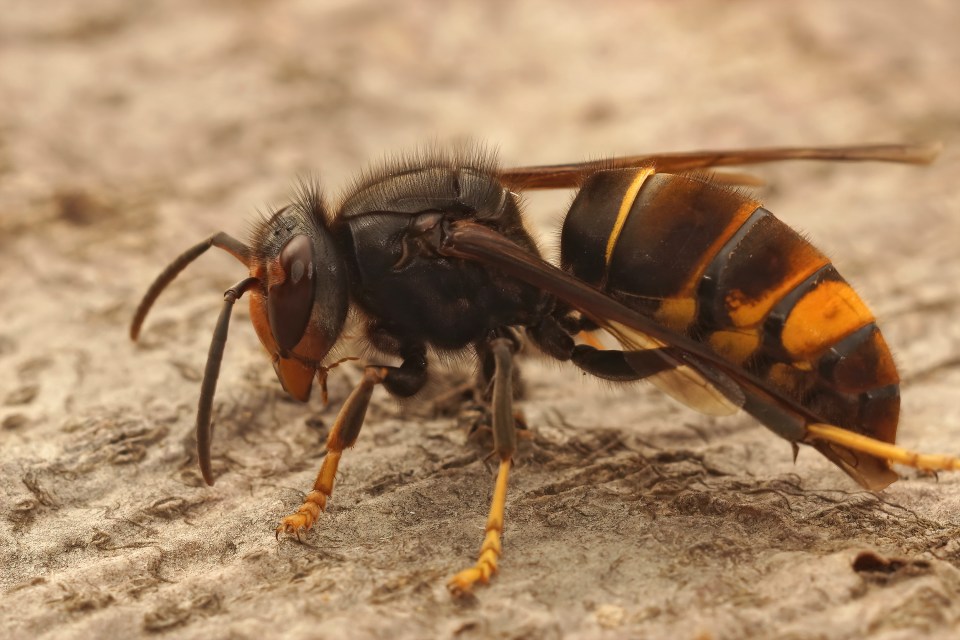BRITS are being warned over an “unprecedented” number of killer Asian hornets set to invade the UK this spring.
The hornets, called Vespa velutina, have strong stings that can cause painful and potentially deadly allergic reactions – and Brits are urged to report any sightings of the impostors.
The 25mm-long creatures eat bees, with experts stating that they can “butcher” 90,000 pollinating insects in just one season.
Sightings of the species were first reported in Britain in 2016, after they became accidentally introduced to Europe back in 2004, in a container of Chinese crockery which arrived in France.
In 2023, a record 72 Asian hornet nests were found in the UK, with numbers falling to 24 in 2024 thanks to the colder spring temperatures.
However, thanks to the high temperatures felt across the UK in the past few weeks, experts fear this year’s number could be even higher than it was two years ago.
Read more science stories
Last week, “unprecedented” early sightings of the killer hornets were spotted in Jersey.
On April 11, a total of 262 Asian hornets were recorded on the Channel Island, an increase of 1090%.
And back in January, the earliest ever confirmed sighting of one of the critters was spotted in Oswestry, Shropshire.
John De Carteret, a founding member of the Jersey Asian Hornet Group warned The Guardian: “The first queens were more than two weeks early this year.
“We’re obviously concerned.”
“When we reach 266 queens, we will equal the total from 2024 – and that figure wasn’t reached until June 25.”
Ian Campbell at the British Beekeepers Association explained that a typical nest of between 2,000 and 3,000 bees can eat more than 11kg of insects per season, equal to the weight of 90,000 bees.
“There’s a strong risk of this year’s numbers being at least as high as in 2023 and the potential to be even higher,” he told The Guardian.
“It would be a surprise if numbers were not above the 2024 level.”
Due to the risks associated with the Asian hornets, the public is being urged to report any sightings to the government’s National Bee Unit via the Asian Hornet Watch app or online
What are Asian hornets and why are they bad?
Asian hornets – also known as yellow-legged hornets – have already invaded much of mainland Europe, US states Georgia and South Carolina, as well as swathes of east Asia.
They first made their way to Europe when a queen was imported into France with some pottery by mistake.
Since then, the insects have rapidly spread into neighbouring countries like the Netherlands, Belgium, and the UK.
The influx of the non-native species has troubled scientists, conservationists and beekeepers across the continent.
They risk damaging biodiversity and contributing heavily to already dwindling bee and insect numbers.
Asian hornets feed on bees and wasps, so can have a devastating impact on the local insect populations.
They also run a risk to people.
In July 2023 it was reported that 10 people needed medical attention after being attacked by the insects in the Channel islands.
The insects have yellow legs, and can be differentiated from other insects by the distinctive orange band on the fourth section of their bodies.
What to do if you get stung by an Asian hornet
Asian hornets, are not typically aggressive, but will defend their nests if they feel that it is being threatened.
If you are unlucky enough to be stung by the invasive species, immediately wash the area with soap and cool water.
You should then apply ice, to stop the venom from spreading further.
The hornets don’t leave a stinger, so you don’t need to worry about removing one.
Health and wellness expert Jay Riggs from Zeal CBD Flower Shop said: “If you have been stung multiple times or notice signs of an allergic reaction then it is important to seek medical attention.
“If you’re in any further pain take an antihistamine or apply hydrocortisone cream or calamine lotion to reduce the stinging and itching sensation”.
